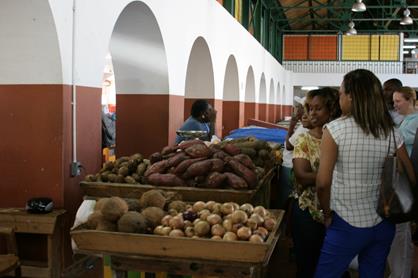|
|
Advancing sustainable food systems in the Caribbean
FAO Press Release
December 04, 2017 3:44 P.M

Participants during the training session. |
Bridgetown, Barbados (TDN)
- In the last few years, integrated and holistic ways to address food-related challenges such as reducing food waste and loss, improving farmer livelihoods, expanding access to affordable food and lowering the risk of nutrition-related non-communicable diseases have become more central to efforts by the Food and Agriculture Organization of the United Nations (FAO) to meet the sustainable development goals (SDGs).
One way that FAO is working to address these issues globally is training FAO staff and national counterparts in adopting food systems thinking. Food systems touch on many aspects of society from agricultural practices, businesses, farmers, consumers, government organizations and the environment. By understanding the linkages between different areas such as agriculture, trade health and nutrition, rural livelihoods and environmental sustainability, practitioners are better able to find the underlying causes, rather than just the symptoms, of unsustainable food systems, and find ways to improve their performance.
This cross-cutting approach was the focus of an October 2017 training hosted by FAO Subregional Office for the Caribbean (SLC) in Bridgetown, Barbados. The week-long session was part of FAO global training programme on “Sustainable Food Systems and Value Chains”, which aims to promote food systems thinking and practice at FAO using a value chain approach.
The Caribbean session successfully wrapped up a series of trainings conducted at Headquarters and at FAORAP and FAOREU offices since July. During the five-day training, 27 participants from across the Caribbean including representatives from FAO and governments were introduced to the sustainable food systems (SFS) and sustainable food value chains (SFVC) approaches to better understand how this thinking can be used in their day-to-day work.
Twelve modules of the session were delivered by Mr. David Neven, Ms. Hanh Nguyen, Mr. Benjamin Doin of FAO SMART Team, Agricultural Development Economics Division (ESA), and Ms. Maria Magdalena Heinrich of FAO Strategic Programme 4 in Rome.
“The training was a great opportunity for FAO staff, its counterparts in member countries and partners from regional organizations to learn what is actually behind the terminology of food systems and value chains, as well as understand better how they can work together towards sustainable food systems in the region,” said Mr. Heiko Bammann, FAO Trade and Markets Officer, who led the coordination of the training on behalf of SLC.
On the fourth day of training, participants had the opportunity to gain more hands-on experience of the cassava value chain through an interactive learning journey. The cassava value chain is the focus of an FAO-supported national programme to improve market linkages and competitiveness of the roots and tubers sub-sector in Barbados.
During the journey, participants followed various steps of the value chain from production to consumption. They learned about the research on roots and tubers variety of the Ministry of Agriculture and the Caribbean Agricultural Research and Development Institute (CARDI), which are key institutional providers of knowledge on new technologies and improved planting material for cassava farmers. The field trip continued to a plantation and several cassava processing sites. Finally, to get an understanding of the distribution and consumption function of the value chain, participants visited a retail bakery that produce cassava blended bread for local consumers. They also visited Cheapside Public Market and the Massey supermarket chain that both offer fresh cassava as well as cassava-based products.
Participant feedback at the end of the training was extremely positive as most indicated that their understanding of SFS and SFVC improved.
“This training helps to facilitate a general understanding among all stakeholders about sustainable food systems as a new area of focus within the agricultural sector,” said Dr. Coleen Phillips, FAO National Correspondent for St. Vincent and the Grenadines.
“We in St Vincent and the Grenadines can pursue capacity building of national institutions across the board to ensure that the necessary planning process, institutional framework and legislation are geared towards the development of a sustainable food system,” she continued.
Possible future trainings include sessions with government officials in St. Vincent and the Grenadines, Belize as well as Jamaica. For more information about FAO training programme on “Sustainable Food Systems and Value Chains”, please contact [email protected].

|
|
|
